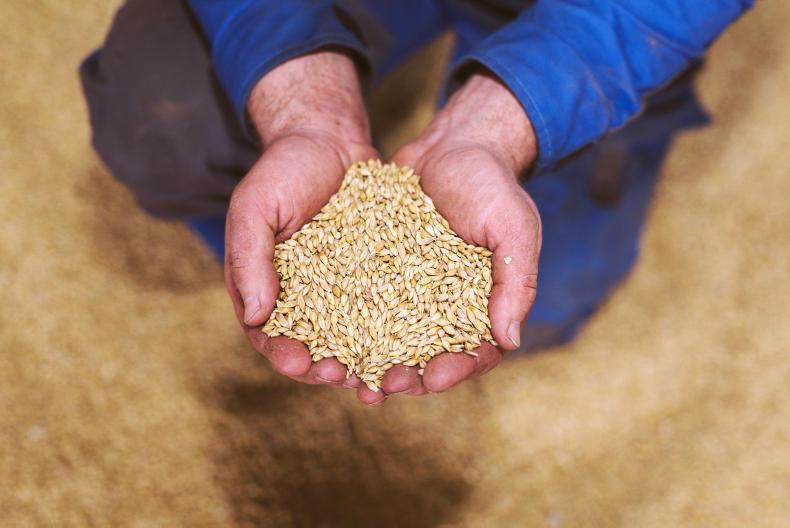In September 2015, Beal Farm on the Northumberland coast in the UK broke the world wheat record by growing 16.52t/ha, displacing the previous record of 15.6t/ha held by a New Zealand farmer for more than five years.
Pushing the world wheat record yield up by not far short of a tonne per hectare is all the more remarkable in that it was achieved with a strictly commercial agronomy programme involving barely two-thirds the amount of nitrogen fertiliser used in the previous record.
Total input costs of under £46/t underline the financial success of the crop, even at feed wheat values of little more than £100/t.
The crop was part of the Agri Best of British Wheat 15t Challenge and Origin’s Agrii team provided the agronomy throughout the crop’s growing season.
Integrated agronomy services is the cornerstone of Origin’s business model and accounts for 60% of profits. At its core is research, innovation and technology and knowledge transfer.
Tom O’Mahony, CEO, believes that the localised nature of the offering is a key strength of the model.
As an agricultural science graduate from UCD, O’Mahony believes the combination of science and practical farming expertise is key to enabling growers to optimise productivity.
He says we need to expand the role of the agronomist beyond crop protection to take on a more holistic role in the process of growing a crop.
He says today’s farmer is much more professional. This is driven by greater scale, increasing regulations and greater risk from increased volatility.
That means becoming involved earlier in the planning stages and advising on soil fertility, rotations, seed selection and establishment techniques.
Growing crops is becoming more complex, driven by an increased prevalence of diseases and grass-based weeds, coupled with increasing pressure on crop protection products as certain strains of weeds and diseases become resistant to current available chemistry. Increased EU environmental regulations are also removing many active ingredients, such as neonicotinoids, from the market.
In the UK alone, Origin employs 280 or 30% of all practicing agronomists.
It has a three-step approach to integrated agronomy. Firstly, it invests in local research centres and has five technology centres, which have more than 59,000 trial units. There are then 28 demonstration farms which localise and put the R&D into practice.
It uses this information to prescribe input programmes based on yield and quality targets.
The agronomists then advise on the timing of applications to achieve maximum results and, through its integrated seed, fertiliser and crop protection businesses, it supplies the inputs.

Tom O'Mahony speaking with Eoin Lowry at the Origin offices in Citywest.
Origin has 42,000 farmer customers who collectively farm 11.8m ha across the UK, Ireland, Poland, Romania and Ukraine. The agronomy covers the establishment, prescription formulation and application, cultivation systems, soil health, field inspections, varietal selection, nutrition and decision support systems, along with the supply of seed, crop protection products and fertilisers.
He believes farming is on the cusp of change due to a“progressive reduction in supports over the medium- to long-term, along with labour shortages, that will drive structural change at farm level as more land is farmed by fewer decision-makers”. He adds that this will likely accelerate in a post-Brexit environment.
O’Mahony also believes that data is going to play a much greater role in agronomy, which will become more customised in the future. This was one of the key reasons why Origin entered into a new research collaboration with UCD last year and followed this by acquiring Resterra, an agri-based software and digital agronomy business, in March this year. This is a new strategic direction for Origin, which provides a separate revenue model to work alongside its current distribution and agronomy business.
New research collaboration
The Origin and UCD research collaboration is a €17.6m investment co-funded 50:50 by Science Foundation Ireland and Origin.
The five-year development programme will leverage UCD’s expertise in data science and Origin’s agronomic data, collected from trial plots and on-farm.
The programme will see 71 people over five years build digital models to assist agronomists and farmers with localised decision support, incorporating real-time data with the aim of maximising crop performance.
Origin also bolstered its in-house science capability with the appointment of Professor Jimmy Burke as head of research and knowledge transfer. This move, along with the UCD partnership, will deepen Origin’s capability and access to science and technology.
Customised agronomy
This will be driven by data. Currently, vast amounts of data are collected daily from trial plots and weather stations. He says this takes the guesswork out of many decisions for the agronomist, allowing them to better manage risk. He says Origin doesn’t need to own the data, but rather be able to plug into the farmer’s data. In exchange, farmers, agronomists and the industry benefits.
He says the farmer will see a greater return in a far more prescriptive advisory model. Inputs will be more targeted, with a greater level of predictability. For example, it may be possible to target specific problems such as blackgrass.
The technology is already here to geo-reference each field, layer in satellite imagery and other data such as biomass indices to determine yields.
“We are going to see the merging of conventional agronomy, crop science and prescriptive data analytics,” according to O’Mahony. He believes this will radically transform how information is transferred to growers on a field-by-field level. It will be a technical prescriptive model, which will focus on productivity returns through the development of automated knowledge transfer capabilities at field level. “It means that Origin will become more service-orientated,” he added.
Resterra will add digital technology capabilities, with a particular emphasis on expanding the group’s data-driven crop management solutions for the benefit of existing and potential new farmer customers and agronomists.
Eastern expansion
Last year, Origin created a footprint in the Romanian integrated agronomy market through the acquisition of two agri supply and service companies.
This is its third country investment in eastern European agriculture and follows previous investments in Poland and Ukraine. With yields of less than 50% of the EU average, input spends lower than the EU average and EU subsidies set to increase above the current level of €150/ha, he says the opportunity exists to increase input spend and enhance yield.
Even though eastern European agriculture is characterised by small, subsistence holdings, he says that there is an emerging, large-scale commercial segment.
O’Mahony says Ukrainian grain farmers are generating good returns, thanks to the competitive advantages of scale and a weak currency.
Farms are consolidating in the region. For example, in 2005, Poland had 2.5m farm units.
Today, it has 1.5m, with 31% of the farms larger than 50ha. Similarly, Romania had 4.1m farm units in 2005 and, today, it has 3.8m units, with 52% of farms over 50ha.
The future
Origin puts agronomy at the centre of the business and is pushing the boundaries of a research-based agronomy services business. Integrated agronomy services now accounts for 59% of revenues and 60% of profits.
Today, Ireland and the UK account for about two-thirds of the business, with central and eastern Europe accounting for the other third.
In the future, central and eastern Europe will play a much bigger component of that. Changing structures look set to bring consolidation opportunities.
Origin’s strategy to grow market share through acquisition rather than organically is prudent and less disruptive to the market. 
Agriculture is changing fast and the combination of Origin’s agronomic expertise, along with Resterra’s technology and the UCD partnership, opens the opportunity to deliver powerful tools to support on-farm decision-making and drive yield and productivity for farmers. With ambitions to expand, build on its core and develop new markets, Origin looks to be on target.
On Brexit
“The uncertainty that Brexit brings is enormous,” according to O’Mahony. He said while the weaker sterling helped cushion output prices for the UK farmer over the past year, there will most likely be a progressive reduction in supports in the future.
However, he adds that opportunities will come from the structural changes that will have to take place across agriculture.
One probable outcome will be a concentration of agricultural production on larger-scale farms to offset the income and cashflow challenges arising from lower subsidy supports, as well as to achieve greater efficiencies in the fixed cost base.
O’Mahony believes that farm business models will change and that farmers will continue to maximise yields through increased reliance on external expertise and technical support.
He says that Origin is well placed in the opportunities that Brexit may bring.
He says Origin is fully committed to the UK, and has shown this by its two recent investments.
On GMOs
He says that until the consumer is convinced of its merits, genetically modified crops are unlikely to get traction in the near term in the EU.
He says there are no incidents that shows GM poses a health risk to people. His biggest fear is that European agriculture is going to become increasingly disadvantaged.

When land is valued, at times, at less than €1,000/acre, the only way it can be done is by productivity gains.
On grain
Grain exports from South American countries are really benefitting from currency weakness, which is making them very competitive.
The UK is continuing to plant, but this will be a game of scale and efficiency into the future. He says farmers need to be efficient enough to ride through the volatile times.
He says the one common feature across all the regions is how farmers increase the value of the land.
He says that when land is valued, at times, at less than €1,000/acre, the only way it can be done is by productivity gains.
The 2017Irish Farmers Journal/KPMG Agribusiness report entitled Agricultural Thinking: inside the minds of global agri leaders comes free with this week's Irish Farmers Journal.
Agribusiness Report 2017: a new Glanbia taking shape
Full coverage: Agribusiness Report 2017
Listen: sustainability top of agenda at Agribusiness event
Agribusiness report 2017: the cutting edge of change in New Zealand